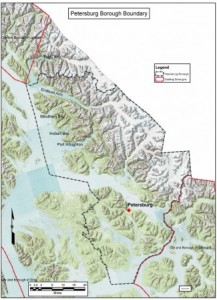
Petersburg spent close to $70,000 fighting to keep its borough boundaries after Juneau contested them in court. Petersburg won a Dec. 4 Alaska Supreme Court ruling, but it’s not getting much of its money back.
Alaska’s Local Boundary Commission approved Petersburg’s petition to change from a city to a borough about three years ago.
That came over the objections of Juneau’s municipal government, which filed a competing claim to some of the same land, just south of its own boundary.
Juneau appealed the decision in state Superior Court, which sided with Petersburg. It also required $1,500 in legal fees to be paid.
“I know that the Superior Court did not award as much as what it cost us, which is why we asked for more,” says Borough Manager Steve Giesbrecht.
He says Petersburg didn’t do any better when Juneau took its case up a legal notch.
“And the Supreme Court upheld the Superior Court’s ruling, which was less that we would like to get,” he says.
To be clear, Petersburg did not ask for all of its legal fees. It requested just under $10,000, about 30 percent of its costs before the higher court took up the case.
Finance Director Jody Tow says total attorney’s fees for the Superior and Supreme Court appeals were a little less than $62,000. Other costs added up to about $7,000. Together, it totaled nearly $69,000.
In contrast, Juneau’s costs involved mostly staff time. Municipal attorney Amy Mead says fighting the case only carried incidental expenses.
Giesbrecht says becoming a borough with a lot more land brought Petersburg new income.
Most of the new property is uninhabited wilderness. But one area, Hobart Bay, includes a small tourist attraction belonging to Juneau-based Goldbelt Inc., an urban Native corporation.
“The land itself is not taxable, but improvements can be. So, yes, we have been receiving a couple of years worth of tax revenue,” he says.
The city-to-borough transition also brought Petersburg nearly a million dollars in government funding.
Finance Director Tow says state revenue sharing and two federal funding programs jumped about $370,000 in the first year. She says the state also contributed $600,000 over three years to support borough organization.
“What Petersburg used the money for was mainly the assessor, to go out to the outlying areas and assess the properties, and the comprehensive plan,” she says.
The municipal government has already dealt with most of the costs involved in changing from a city to a borough.
But Manager Giesbrecht says there remains the question of three state-owned docks. They’re at Entrance Island, at the mouth of Hobart Bay, Kupreanof and Papkes Landing.
The state wants the borough to take them over and fix them up, as it has done with other harbors within municipal boundaries. The state usually provides some repair funds. Giesbrecht says one of the three docks was within the area contested in court. The other two were not.
“They kind of wanted an all-or-nothing type deal. I don’t know that that will happen. But I think they were interested in looking at all three of those properties including the Entrance Island float in one transaction,” he says.
Giesbrecht says Kupreanof and Papkes Landing repair or replacement could total as much as $3 million. He has no estimate for Entrance Island.
Another possible cost could have been relations between Petersburg and Juneau. But Mayor Mark Jensen says it wasn’t personal.
“There were never any hard feelings. Of course, you’d wish they wouldn’t have appealed it. But they did, and so, you just have to go through the process,” Jensen says.
Juneau municipal attorney Mead says she doesn’t see any problems. She says her appeals targeted the commission that set the boundaries, not Petersburg.
Ed Schoenfeld is Regional News Director for CoastAlaska, a consortium of public radio stations in Ketchikan, Juneau, Sitka, Petersburg and Wrangell.
He primarily covers Southeast Alaska regional topics, including the state ferry system, transboundary mining, the Tongass National Forest and Native corporations and issues.
He has also worked as a manager, editor and reporter for the Juneau Empire newspaper and Juneau public radio station KTOO. He’s also reported for commercial station KINY in Juneau and public stations KPFA in Berkley, WYSO in Yellow Springs, Ohio, and WUHY in Philadelphia. He’s lived in Alaska since 1979 and is a contributor to Alaska Public Radio Network newscasts, the Northwest (Public Radio) News Network and National Native News. He is a board member of the Alaska Press Club. Originally from Cleveland, Ohio, he lives in Douglas.




